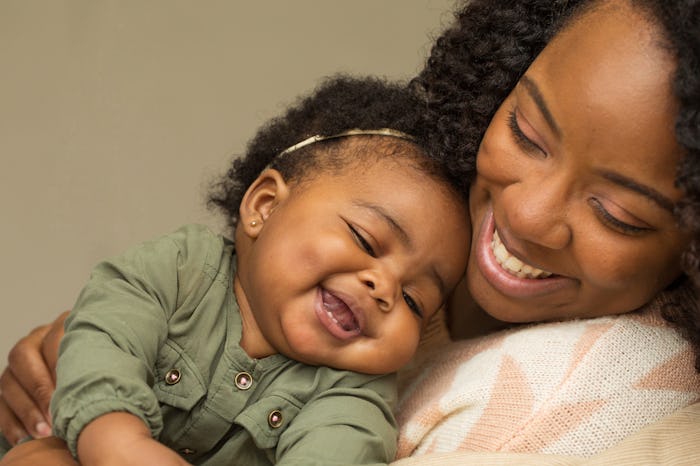Life

How Cuddling With Your Baby Affects Your Brain, According To Science
The ways in which your baby benefits from your cuddle have long been espoused. From helping brain development, to strengthening feelings of attachment, a mother's embrace is one of the most potent newborn medicines. But what about you, mom? After all, there's something visceral about snuggling your baby. How could you not be getting something out of that coveted cuttle time, besides just "good feels"? If you're wondering how cuddling with your baby affects your brain, have no fear: you're definitely onto something.
When experts talk about "cuddling" and newborns, they often mean skin-to-skin care (SSC) or Kangaroo Care (KC). According to a 2014 study published in the Journal of Perinatal Education, cuddling, or SSC, is described as placing an unclothed newborn on their mother’s bare chest, with a warm, light blanket and/or towel covering the newborn’s back. As the study explains, at least an hour of SSC is what The World Health Organization (WHO) recommends all healthy breastfeeding women in hospital settings be provided after having given birth, and that any routine procedures or newborn assessments be done during the SSC period (or afterward).
It is during this initial cuddle period between mother and child, that the "magic" happens. Or, more scientifically, when a mother starts to reap the brain benefits of cuddling, too. The 2014 aforementioned study finds that the chemical oxytocin, which increases significantly during SSC, has equal benefits to mom's and their baby's brains. The increase in oxytocin, the study states, "promotes maternal/newborn attachment, reduces maternal and newborn stress, and helps the newborn transition to postnatal life." And though that last one is more about the baby than mom, technically, if your baby transitions to postnatal life more easily, that will cause less stress on you in the long run.
Another study, referenced by the American Academy of Pediatrics (AAP), further highlights the brain benefits a mom can enjoy after cuddling her baby. The 2015 study found that mothers of premature infants who held their babies in SSC (in this case, specifically, inside the pouch of the parent's shirt) for at least an hour reported an objective decrease in stress levels after having cuddled their babies. Dr. Natalia Isaza, a neonatologist, explains to the AAP that decreasing your stress level can potentially have other far reaching effects on things like your health, your relationship with your partner, and your ability to breastfeed. Dr. Isaza states:
"Now we have more evidence that skin-to-skin contact can also decrease parental stress that can interfere with bonding, health and emotional wellness, and the interpersonal relations of parents, as well as breastfeeding rates."
But you don't necessarily have to have your baby unclothed (i.e. skin-to-skin) to reap the brain benefits of cuddling. A study published a few years ago in the journal Frontiers in Psychology shows that when moms breathe in the smell of their own newborns, it releases a reward-seeking response in the brain. These are, as The New York Times' blogger Douglas Quenqua writes, "the same dopamine pathways that light up after ingesting cocaine, enjoying food, or other reward-inducing behavior." So when you snuggle your baby, you're also rewarding yourself — technically, in a chemical way.
The next time you cuddle your baby, know that you're not imagining all those magical, relaxing, sweep-you-off-your-feet feelings. Also, isn't it nice to know that while you might feel like you're losing brain cells from all those sleepless nights, at least some good things are happening up there in that noggin' to balance it out.